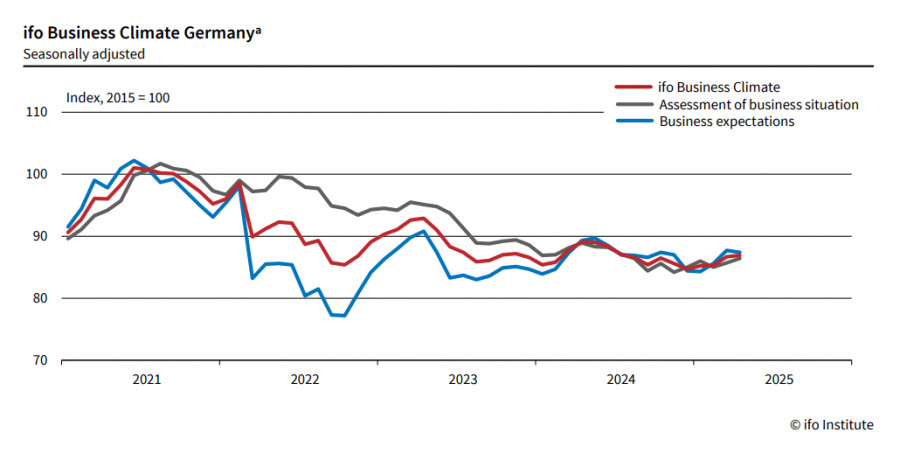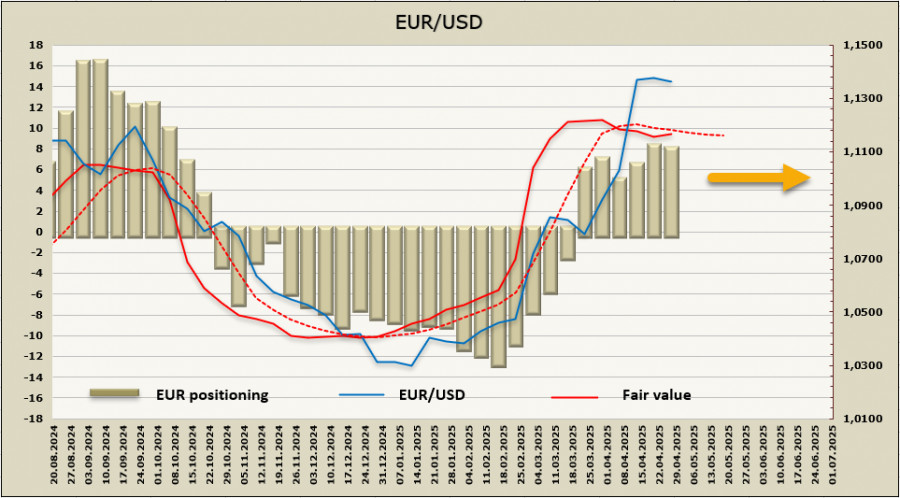See also


 29.04.2025 12:54 AM
29.04.2025 12:54 AMBusiness activity indices in the eurozone are declining amid heightened uncertainty. The composite index in April fell from 50.9 to 50.1, nearing contraction territory.
At the same time, Germany's Ifo Business Climate Index rose, as did the current conditions index, while only the expectations index slightly declined, reflecting uncertainty about the future.
As inflation in the eurozone continues to decrease, the European Central Bank faces the need to cut rates in June. However, according to Reuters, there is little enthusiasm for taking this step. The EU has yet to respond to the introduction of 20% tariffs, while business activity growth is slowing, and the pace of average wage growth has significantly declined.
Confidence in the dollar has been undermined by the rapid moves of U.S. President Trump, which, in turn, contributed to lower inflation in the eurozone against the backdrop of a strengthening euro. All these factors argue in favor of a rate cut, which could put pressure on the euro. ECB officials' comments are generally optimistic: for example, last week, Christine Lagarde stated that "the disinflation process is progressing so successfully that it is nearing completion." At the same time, Klaas Knot, President of the Dutch Central Bank, believes that although economic growth will slow in the short term, inflation will also become more subdued.
The news is mostly negative, but expecting a 50-basis-point cut in June appears insufficient. At the same time, a 25-basis-point cut is already priced in by the markets, making it unlikely to be a serious bearish factor for the euro. If the dollar were in good shape, the EUR/USD pair would likely have already found an opportunity to turn south, but for now, there is no apparent reason for such a reversal. Political factors, especially trade negotiations, may play a role, but both sides exercise caution and avoid sharp statements.
The net long position on the euro decreased by $0.5 billion to $9.3 billion over the reporting week. Positioning remains bullish, and the fair value once again indicates the possibility of developing bullish momentum.
The euro has lost momentum and is consolidating near the recent high. However, signs of a downward movement have diminished. A week ago, we assumed that EUR/USD would decline to the 1.1210 support level and potentially break lower, but the growing weakness of the dollar once again calls this scenario into question. A decline toward 1.1210 remains possible, but using it as an opportunity for new purchases seems more appropriate as the signs of resumed growth have strengthened. We expect an attempt to test the recent high at 1.1575.
At the same time, in the longer term, the euro's strength appears less convincing. Market sentiment suggests that the ECB could lower the deposit rate to 1.5% by the end of the year. In that case, even considering problems in the U.S. economy, the euro would struggle to compete against the dollar, which would offer a significantly higher yield — unless, of course, by that time, recession signs in the U.S. become more evident and force the Fed to cut rates more aggressively.
You have already liked this post today
*The market analysis posted here is meant to increase your awareness, but not to give instructions to make a trade.
The turbulence of recent months, driven by Donald Trump's actions and the release of fresh U.S. economic data, has done little to help investors understand the true direction of asset
The GBP/USD currency pair failed to show any decisive movement on Friday—it neither rose nor fell significantly. Many analysts interpreted the U.S. labor market and unemployment data as positive simply
The new week promises to be informative for EUR/USD traders. Most notably, the next Federal Reserve meeting, scheduled for May 6–7, will determine the central bank's future course of action
Training video

Your IP address shows that you are currently located in the USA. If you are a resident of the United States, you are prohibited from using the services of InstaFintech Group including online trading, online transfers, deposit/withdrawal of funds, etc.
If you think you are seeing this message by mistake and your location is not the US, kindly proceed to the website. Otherwise, you must leave the website in order to comply with government restrictions.
Why does your IP address show your location as the USA?
Please confirm whether you are a US resident or not by clicking the relevant button below. If you choose the wrong option, being a US resident, you will not be able to open an account with InstaTrade anyway.
We are sorry for any inconvenience caused by this message.


